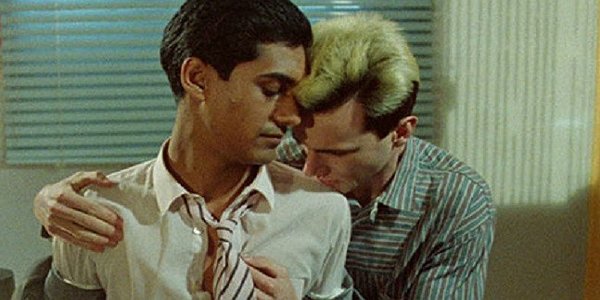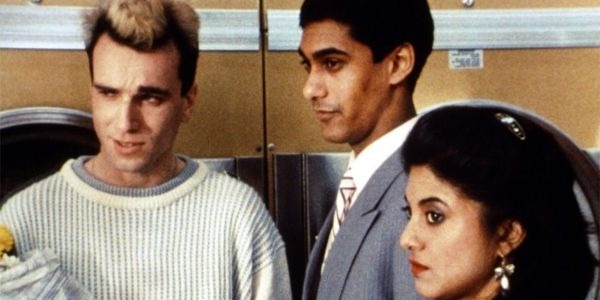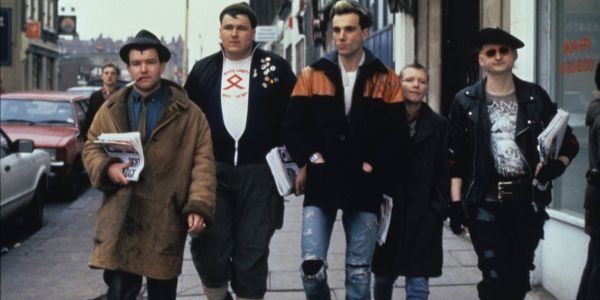Queerly Ever After #19: MY BEAUTIFUL LAUNDRETTE (1985)
Amanda Jane Stern is an actress, writer, and director from…
Queerly Ever After is a bi-monthly column where I take a look at LGBT+ films that gave their characters a romantic happily-ever-after. There will be spoilers.
Thank you for journeying down the rabbit hole with me in my investigation into Happy Endings Sleepover, we now return to our regular programming with one of my all-time favorite movies, My Beautiful Laundrette. Set in Thatcher-era England at a time when anti-immigrant sentiment had reached a boiling point, (given the rise of anti-immigrant sentiment in the UK and US today, this film has taken on an almost Brechtian timeliness) the film centers on Omar (Gordon Warnecke), a young British Pakistani man, and his boyfriend Johnny (Daniel Day-Lewis), a white, former fascist, who run a laundromat, given to Omar by his uncle, together.
Incidentally Gay
This film is about a lot of things, but at the end of the day it boils down to a story of star-crossed lovers. To the film’s credit, Omar and Johnny are not star-crossed because of their sexuality, but because of their backgrounds. Omar is the Britain-born son of Pakistani immigrants, while Johnny is a white boy who fell in with the National Front (a far-right political party that is wildly anti-immigrant). Them being gay is never even mentioned, nor is it something they struggle with.

A lesser screenwriter would certainly have made their sexuality a major point of contention in the film, but Hanif Kureishi knew he had other things to focus on. According to Kureishi, in an interview that was quoted in Vito Russo’s book “The Celluloid Closet”, when he initially conceived of this story, Omar and Johnny weren’t gay. However, when he had all his characters lined up and his plot thought out he realized something was missing, a love story. So, he took stock of his script and realized that Omar and Johnny were the heart of his film and it just made sense that they were in love. Stephen Frears, the director agreed with Kureishi’s assessment that the film was not a gay story, but just a story where the main couple was gay.
That being said, Omar and Johnny are still star-crossed lovers. The film tells us that the two have known each other since they were five-years-old when they met in school. Not only that, but before Johnny became a fascist, he and Omar were best friends. The film never tells us whether their previous relationship was that of just close friends or lovers, but based on how quickly they fall into a romantic relationship when they reconnect, I lean towards believing they were a couple when they were younger too.
Old World vs. New World
There are two central conflicts that arise in this film: racism and Omar’s internal struggle to balance the old world of his father and the new world of his uncle. Omar, whose family hails from Pakistan, has never been away from the UK, nor does he know his family’s native tongue of Urdu. However, his father (Roshan Seth), a former celebrated journalist in Karachi and a socialist, longs for the world he knew in Pakistan. Following set back after set back in the UK, the rise of racist sentiment in his adopted country, and the suicide of his wife, he has become a despondent drunk.
His uncle Nasser (Saeed Jaffrey) on the other hand, has adopted more of the western world than his brother. An avowed capitalist, he runs a multitude of businesses, including the laundromat that he gives Omar to run. He also has a white, British mistress named Rachel (Shirley Anne Field) who he parades around his friends and Omar, but keeps hidden from his family. While he has accepted the capitalist system of Thatcher-England, he still tries to present a version of old world tradition in his marriage. Something which his eldest daughter, Tania (Rita Wolf) finds both hypocritical and infuriating.

The relationship between Nasser and Rachel is used as an interesting parallel to the relationship between Omar and Johnny. Nasser and Rachel keep their relationship as secret as they can so that Nasser can keep up the appearance of being a family man at home. As long as Nasser straddles the line between the world he is from and the world he has created, their relationship can never be in the open.
Omar and Johnny on the other hand, represent the intertwining of different cultures. Where Nasser hides Rachel from his family, Omar brings Johnny to meet them, daring them to comment. While they never explicitly state to anyone that their relationship is more than friendly, they don’t hide it either. Not only that, everyone seems to immediately comprehend that Omar and Johnny are a couple. Tania spots it the first time she meets Johnny, as does Nasser’s unscrupulous friend, Salim (Derrick Branche). When Tania decides she’s had enough and leaves town, she asks Johnny to come with her, telling him that if he stays with Omar, her family will ruin him. Johnny though tells her as long as he has Omar, they’ll get through it. Where Nasser and Rachel let the outside world beat them down, Omar and Johnny will face it together headfirst.
Race Wars
Somewhere in their teenage years Johnny, as many embittered white men are wont to do when they perceive their troubles as being caused by others, joined the National Front and started running with a bad crowd. This led to the dissolution of Omar and Johnny’s formerly close relationship, compounded by Omar’s father seeing Johnny marching with fascists and chanting to send immigrants back where they came from.

This former betrayal does play a part in their rekindled relationship. While Omar deeply loves Johnny, he still feels hurt, not so much for him but for his father who had often taken Johnny in when he was young and helped him. Johnny, for his part, knows how much he screwed up and wants to atone for that, though he is still having trouble completely distancing himself from his old group. Things come to a head when Salim clashes with the fascist group, and while Johnny loathes Salim (for valid reasons, mostly for his treatment of Omar which has included threatening him and even once accosting him) he steps in to save him from his old gang, effectively severing his ties with the white supremacists and stating where he now stands.
My Beautiful Laundrette: In Conclusion
There is so much going on in this movie, and there are a lot of things I wasn’t even able to get to, and I think that’s all to this film’s credit. This movie is one of my all-time favorites, not just in regard to my column but in terms of all movies. And I’m not alone, this movie was originally shot as a made-for-TV movie, but ended up getting theatrical distribution and being nominated for a best screenplay Oscar at the Academy Awards.
Not only is it a brilliant take on star-crossed lovers, it doesn’t take the twists and turns you’d expect a story like this to take. Where a lesser screenwriter would have killed off either Omar or Johnny, so that the other could make some impassioned speech about the need for us to get along, and everyone would leave sad and chagrined, Kureishi lets the boys end up together. Yes, there are challenges that they will have to face from both Omar’s family and Johnny’s former gang, but as long as they love and support each other they will get through it.
My Beautiful Laundrette came out November 16, 1985 in London and April 4, 1986 in the US. For all other release dates, see here.
Does content like this matter to you?
Become a Member and support film journalism. Unlock access to all of Film Inquiry`s great articles. Join a community of like-minded readers who are passionate about cinema - get access to our private members Network, give back to independent filmmakers, and more.
Amanda Jane Stern is an actress, writer, and director from New York City. She received her BA in Film, Television & Interactive Media and Theater Arts from Brandeis University. She loves regaling whomever will listen with her endless lists of fun facts and knowledge of film history. Follow her on twitter and instagram @amandajanestern













